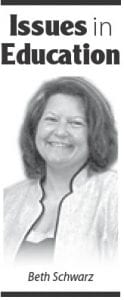Do you remember paying art fees, music fees, lab fees, shop fees, athletic fees, technology fees, academic enrichment fees and buying $20+ of “back to school” supplies when you were in school? I don’t.
Fortunately, Cook County School District does not implement all of these different fees, but we do incorporate some. Why? Because the basic education formula has not kept pace with inflation for the past 12, yes, 12 years. Minnesota is projected to have a $2 billion surplus and yet, once again, it appears the basic formula funding increase will be less than what schools need to provide a mandated American Right: access to free and appropriate education.
Since 1862, Minnesota schools have been prohibited from charging tuition. Tuition is still not charged, instead, we go to voters for operating levies, run very tight budgets and ask parents to pay fees.
In addition to the basic formula, school districts do get categorical aids which offset some expenditures. Categorical aids are based on a quagmire of formulas, many depending on the number of students enrolled or property wealth. Because our enrollment is low and our property wealth is high, Cook County School District often does not qualify or receives only small amounts through several categorical aid categories.
The geographic size of our district and the number students qualifying for free or reduced lunch are two factors which help generate revenue for the district through categorical aids.
Minnesota legislators are pulling together the E12 education bill right now. Currently, there is a broad span between the House, Senate and governor’s education targets ranging from $157 million in the House to the governor’s proposal of $695 million. The Senate lands in the middle with a spending target of $361 million.
Both the Senate and the governor are proposing 1 percent increases on the basic formula for each of the next two years with the rest of funds going toward categorical aids. The house is proposing increases of .56 percent for each year. The average rate of inflation for the last 15 years according to the Bureau of Labor Statistics has been 2.37 percent.
All three spending targets include increased funding for Early Childhood which is very encouraging. The conversations around Early Childhood suggest there will be an increase in funding for these programs; again, however, the spending targets are very different.
The Senate’s E12 bill also includes language for long term facility maintenance and an increase in Success for the Future funding. The Senate language for long term facility maintenance could significantly help the District but is absent from the House bill. Success for the Future funding is in both the House and Senate, but at much lower funding levels than the governor has proposed.
The House bill contains language putting equalization aid in for districts with more than 30 percent seasonal recreation property. This would provide our local taxpayers with some property tax relief without reducing funding for the District. The Senate education bill does not include this language, but it is possible it will be included in the Senate’s tax bill.
These are just a few key points in the proposed E12 funding bills. It is not too late to contact your local legislators and any other legislators you may know. Letters, emails and phone calls should be brief focusing on the need for an increase in the basic formula to keep pace with inflation (2.37 percent each year); increased funding for early childhood, long term maintenance, and Success for the Future; and encouragement to include equalization for districts with more than 30 percent seasonal recreation property.
Don’t forget to thank our legislators for what they do, with the E12 bills being so different they have a lot of work ahead! Maybe with a little encouragement, we can move toward providing students what has been promised in law, a free and appropriate education.
Each month a representative of our local schools will offer thoughts in Issues in Education. This month’s s contributor is Beth Schwarz, superintendent of School District 166.



Loading Comments